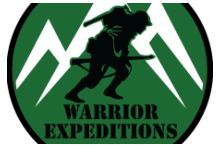Warrior Expeditions offers three long-distance outdoor therapy programs: Warrior Hike, Warrior Bike, and Warrior Paddle. Each program lasts 3-6 months and covers between 2,200 – 3,700 miles. Veterans start their program together and receive all the training and equipment necessary to complete their journey, as well as psycho-educational training and trailside support. Programs are free for combat veterans.
Our mission is to:
- Teach veterans to use the outdoors as a long-term ... Meer lezen
Warrior Expeditions offers three long-distance outdoor therapy programs: Warrior Hike, Warrior Bike, and Warrior Paddle. Each program lasts 3-6 months and covers between 2,200 – 3,700 miles. Veterans start their program together and receive all the training and equipment necessary to complete their journey, as well as psycho-educational training and trailside support. Programs are free for combat veterans.
Our mission is to:
- Teach veterans to use the outdoors as a long-term coping strategy for mental and physical health issues resulting from their military service.
- Help veterans use the time and space of a long-distance expedition to decompress and process their wartime experiences.
- Through veteran camaraderie and community interaction, help veterans reintegrate into society, restore their faith in humanity, and build a support network.
Programs include:
Warrior Hike on the Appalachian Trail: through-hiking 2,200 miles from Georgia to Maine.
Warrior Bike on the Great American Rail Trail: biking 3,700 miles from Washington DC to Washington state.
Warrior Paddle on the Mississippi River: paddling the entire 2,320 miles of river from Minnesota to Louisiana.
Warrior Expeditions’ founder, Sean Gobin, was honored as a CNN Top Ten hero for his work. Short CNN clips summarizing our programs can be viewed at:
https://www.youtube.com/watch?v=sJHOW-YiYjI&t=15s
https://www.youtube.com/watch?v=ZRcZiPRx1r4&t=4s
The following short videos provide an excellent overview of the program and its impact on veterans:
https://www.youtube.com/watch?v=tgZgaAJY168&t=43s
https://www.youtube.com/watch?v=76pfK67dnJU&t=2s
Methodology:
Participating veterans receive all the gear, equipment, and support they need to complete a long-distance outdoor therapy program. Experienced Warrior Expeditions staff spend 3 days at the beginning of each expedition training veterans in outdoor skills and the use of their gear. We shadow participants for their first week on each trail and maintain regular contact throughout the program.
During the expedition, Warrior Expeditions coordinates overnight rest-stops approximately weekly in trail towns along the route. During these visits, veterans interact with and receive pre-arranged logistical support (including food, transportation, and lodging) from local veteran and community groups. In addition, Warrior Expeditions regularly replaces worn/broken gear and provides up to a $300 monthly budget for resupply.
Participants are introduced to our licensed clinical psychologists at the beginning of their expedition. The veterans take a series of psychological surveys/interviews before and after the program. During the journey, participants receive weekly psycho-educational counseling strategies from the psychologists. These strategies are based on the Cognitive Behavioral Therapy (CBT) framework to help normalize post-combat reactions and help integrate back into society. CBT is a problem-focused and action-oriented approach that helps recognize and alter dysfunctional or maladaptive emotions, thoughts, and behaviors. Psychologists are always available to answer questions.
Results:
Since 2013, our psychologists have gathered mental health data before and after expeditions. Veterans consistently show meaningful improvements in physical and mental well-being, including decreases in anxiety, depression, and PTSD symptoms, increases in quality of sleep, and improved ability to feel and process emotions. A summary of results can be found at: https://warriorexpeditions.org/impact/quantitative-impacts/
In addition to the immediate health benefits, Warrior Expeditions programs are designed for long-term impact. Veterans learn outdoor skills and behavioral therapy basics that they can use the rest of their lives. Veterans keep their equipment to re-use after their expedition and Warrior Expeditions hosts a multi-day Reunion Weekend to re-connect former participants with nature therapy and each other. Several program graduates are now active volunteers (or employees), acting as mentors and coaches for new veterans or helping develop new trails.
Volledige tekst verbergen
